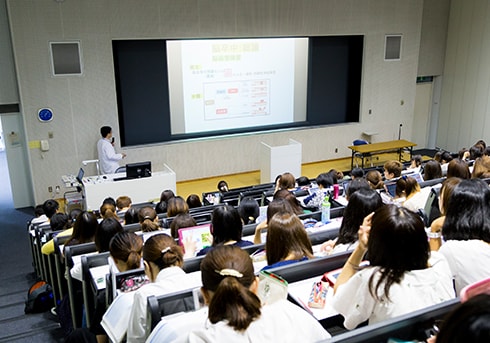Links
The Three Policies
Three Policies
Read about SPU's undergraduate and graduate policies on admissions, curriculum and diploma.
The School of Health and Social Services
School of Health and Social Services
Department of Nursing
Acquiring reliable skills to support people and the future of themselves
The Department of Nursing proactively incorporates mission-oriented learning in small groups to educate students to be nurses with "the ability to act independently" and "the ability to work as a team."
Qualification acquired when graduation requirements are met ; Examination pass rate
Eligibility to take the National Nursing Examination
2018 National Nursing Examination pass rate:
98.4%(National average:94.7%)
Optional qualifications and licenses:
Students are screened and chosen through a selection process.
Prescribed credits are required for qualifications and licenses.
1.Eligibility to take the National Public Health Nursing Examination
(Not more than 40 students per year, including students who transferred into SPU junior year)
2.Eligibility to take the National Midwifery Examination
(Not more than 25 students per year, including students who transferred into SPU junior year)
3.Nursing Teacher Type I license
(About 10 students per year, not including students who transferred into SPU junior year)
Department of Nursing
Department of Physical Therapy
Students master scientific knowledge and technical methodology
The Department of Physical Therapy develops specialists who perform warm-hearted physical therapy using medical and scientific knowledge and techniques.
Qualification acquired when graduation requirements are met ; Examination pass rate
Eligibility to take the National Physical Therapy Examination
2018 National Physical Therapy Examination pass rate:
97.6%(National average:92.8%)
Department of Physical Therapy
Department of Occupational Therapy
Developing experts who apply science in lifestyles
The Department of Occupational Therapy provides medical knowledge, together with specialized knowledge and techniques necessary for occupational therapy, through lectures, on-campus training and e-learning while also offering practical training opportunities to students from their freshman year.
Qualification acquired when graduation requirements are met ; Examination pass rate
Eligibility to take the National Occupational Therapy Examination
2016 National Occupational Therapy Examination pass rate:
92.9%(National average:80.0%)
Department of Occupational Therapy
Department of Social Work and Child Science
Social Work
Tackling diverse social work issues in the modern society
This division prompts proactive learning and offers a learning environment for students to acquire practical knowledge. It also offers diverse practice opportunities each year with an emphasis on direct involvement with welfare service beneficiaries so that students can refine their problem identification and problem-solving skills.
Qualifications acquired when certain subjects are taken ; Examination pass rate
Eligibility to take the National Social Worker Examination
Eligibility to take the National Social Worker Examination
2016 National Social Worker Examination pass rate:
75.4%(National average:55.5%)
Optional qualifications and licenses:
In addition to eligibility to take the National Social Worker Examination, students have the option to either acquire eligibility to take the National Psychiatric Social Worker Examination or acquire qualifications as a nursery school teacher. Prescribed credits are required for the qualifications.
1.Eligibility to take the National Psychiatric Social Worker Examination
(Not more than 10 students per year, not including students who transferred into SPU junior year)
2.Nursery School Teacher qualification
(Not more than 10 students per year, not including students who transferred into SPU junior year)
Social Work
Child Science
Developing specialists who create futures for children
This division develops professionals who will play central roles for childcare, and consequently offers subjects required to become kindergarten and nursery school teachers in addition to the basic subjects on social care. Students also acquire practical skills in classes and childcare practice sessions.
Qualification acquired when graduation requirements are met and license
Kindergarten Teacher Type 1 license
Optional qualifications and licenses:
In addition to the kindergarten teacher Type 1 license, students can acquire qualifications for a nursery school teacher.
1.Nursery school teacher qualifications
2.Eligibility to take the National Social Worker Examination
Taking subjects in the Social Welfare qualifies students to take the National Social Worker Examination. Prescribed credits are required for the qualifications and the licenses.
Child Science
Department of Health Sciences
Behavioral Sciences
Discovering what's beyond health
This division fosters generalists with knowledge of diverse health issues, who can communicate with professionals of different fields.
License that can be acquired when graduation requirements are met and designated subjects are taken:
School Nurse Type I license
*Prescribed credits are required for the qualifications and the license.
Behavioral Sciences
Laboratory Sciences
Developing health science from biological information
This division educates students to become "specialists who develop health science from biological information," understand the responsibilities and roles of clinical tests in the medical field, and be capable of applying the latest clinical testing technologies that evolve every day.
Qualification acquired when graduation requirements are met ; Examination pass rate
Eligibility to take the National Examination for Clinical Laboratory Technicians
2018 National Examination for Clinical Laboratory Technicians pass rate:
95.2%(National average:86.5%)
Optional qualification and license:
Prescribed credits are required for the qualification.
Eligibility to take the Certification Test for Health Foods Managers
Laboratory Sciences
Oral Health Sciences
Specialists who promote health through oral science
This division, together with the Behavioral Sciences and Laboratory Sciences divisions, educates students to become specialists who promote health through the oral science realm through learning the divisions' common life science framework and pursuing the health of people from broad perspectives.
Qualification acquired when graduation requirements are met ; Examination pass rate
Eligibility to take the National Dental Hygienists Examination
2018 National Dental Hygienists Examination pass rate:
100%(National average:97.6%)
Optional qualification and license:
Students may also be qualified for the following license, in addition to their eligibility to take the National Dental Hygienists Examination. Prescribed credits are required for the qualification.
School Nurse Type I license
Oral Health Sciences
Curriculum features
Curriculum features

Center for University-wide Education
Offering liberal arts studies and basic education on healthcare and social services
In addition to the five departments, SPU also has the Center for University-wide Education. While students do not major here, the center offers a liberal arts program that creates basis for thinking about human dignity and teaches the foundations of health and social services based on SPU's philosophy and embracement of "Collaboration and Integration." In terms of research, faculty from various fields endeavor on activities in the interdisciplinary field in addition to proactively progressing on their research in their specialized areas.
Read more

Interprofessional education
Team care beyond academic fields can respond to today's needs of users
Through collaboration across different fields (divisions), SPU incorporates interprofessional education (IPE) in which students learn together, learn reciprocally and learn about one another to become professionals who can respond to user needs. IPE features hands-on experience through practice and exercises in its curriculum for students to acquire practical interprofessional competencies.
Read more
Graduate School of Health, Medicine and Welfare
Graduate School of Health and Social Services
Master's program
The program places focus on recurrent education.
Professionals who deliver appropriate health and social services in integrated form while possessing extensive expertise on specific fields are in high demand to respond to Saitama residents' needs towards health and social services that are becoming increasingly complicated and diversified.
SPU offers a two-year master's program to develop such high-quality, sophisticated professionals.
Doctoral program
The program develops healthcare and social services personnel for the next generation through education collaborating with professionals.
The doctoral program develops personnel who will contribute to Saitama's upcoming ultra-aging population. The program aims at improving the lifestyle qualities of residents from comprehensive perspectives including nursing, rehabilitation, theories and technological developments on health and social services, and system development. It further endeavors to develop human resources as research-oriented professionals, educators or researchers in independent leadership positions possessing specialized knowledge built from the academic fields of health and social services.
Environments suitable for working adults
We are providing an educational research environment that allows graduate students of society to learn such as long-term study student system, weekday night and Saturday opening, satellite campus, education and training benefit system.
Read more (Japanese)
Three Policies (Graduate School of Health and Social Services)
Read about SPU's policies on admissions, curriculum and diploma.
Read more
Graduate School of Health and Social Services